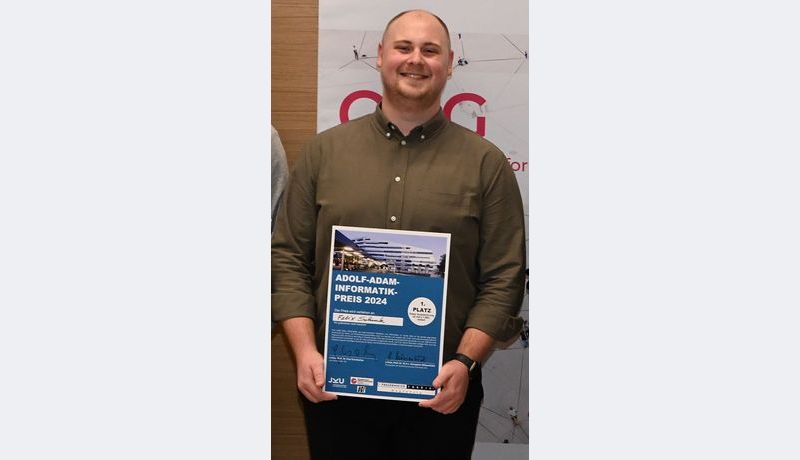Three Johannes Kepler University Linz graduates were presented with this year’s annual Adolf Adam Computer Science Award.

Felix Schenk won first place in recognition of his graduate thesis titled “Development of a Java Debugger Framework Based on the Espresso VM and Its Compilation to JavaScript”. High school students from throughout Upper Austria served as the jury.
Some 500 higher level school students not only attended the presentations and awards ceremony, they used their cell phones to vote for the winner, selecting Felix Schenk for the first-place award in recognition of his presentation titled “Kein Setup, kein Problem — Mit JavaWiz online Programmieren lernen”. The award winner remarked: “My goal was to make programming more accessible as well as comprehensible in laymen’s terms.”
The three finalists:
Nina Brandl: “Quantum Secrets - mit Teleportation und Verschränkung zum nächsten Supercomputer?”
Nina Brandl’s paper titled “Efficient and Noise-aware Stabilizer Tableau Simulation of Qudit Clifford Circuits” explores the potential of higher-dimensional quantum systems and describes stabilizer formalism as an efficient method to represent states and simulate Clifford circuits.
Felix Schenk: “Kein Setup, kein Problem — Mit JavaWiz online Programmieren lernen”
Felix Schenk’s paper titled “Development of a Java Debugger Framework Based on the Espresso VM and Its Compilation to JavaScript” focuses on extending JavaWiz (a visual debugger) to enable easy access via a website. As a result, even beginners can easily get into programming. The tool facilitates step-by-step Java program execution and features useful visualizations for each program status.
Matthias Wöß: “Analyse von Java-Programmen — Wo sind die Hotspots?”
Matthias Wöß’ graduate thesis titled “A Profiler for Java Programs” focuses on creating a cross-platform profiler which software developers can use to not only find runtime bottlenecks and unused code in programs, but also pinpoint often-used program sections that require frequent optimization.
Outstanding Quality and Diversity
The award is open to graduates enrolled in the JKU Master's degree program in Computer Science who have successfully completed the program during the previous academic year and earned a “1” on their thesis. A jury of experts nominated the top three students to take part in the finals. Jury chairman a. Univ. Prof. Paul Grünbacher remarked: “The demand for qualified computer scientists is high in many areas. I am pleased that so many young people came to the JKU. The award-winning presentations demonstrate a high level of diversity and excellence in our computer science program. I would like to congratulate the finalists on their outstanding work as well as their ability to present their topics in a very creative, engaging, and easy-to-understand format.”
About the Award and its Namesake
Endowed with €1,500 in prize money, the computer science award is sponsored primarily by Primetals Technologies, the Austrian Computer Society, and the Austrian Society for Computer Science. Named after Prof. Adolf Adam (1918-2004), the award is presented to an Austrian statistician and computer scientist. Prof. Adam was appointed to the University of Social and Economic Sciences in Linz in 1966 and created the Linz Information Science Program (LIP), paving the way to establish computer science as a recognized academic degree program. Linz was the first Austrian university to create a degree program in computer science program in 1969. Prof. Adam is also credited with leading the initiative to rename the university Johannes Kepler University Linz in 1971.
About Felix Schenk
Felix Schenk (25) lives in Linz and works for Oracle Labs in Linz. During his spare time, he enjoys doing improv theater and photography.












